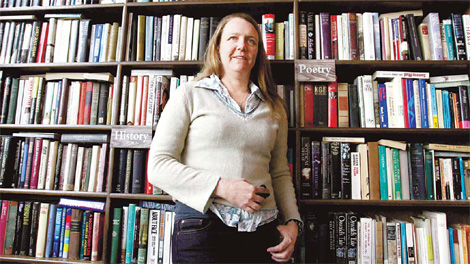Books in action
By Chitralekha Basu (China Daily)
Updated: 2010-03-05 09:46
 |
Large Medium Small |

Performance will be as much a part of the offerings as the printed word at The Bookworm's literary festival that begins on Friday, Chitralekha Basu reports
Seventy authors. Three cities. More than 100 events. The Bookworm International Literary Festival (BILF), a two-week celebration of the word - spoken, written, performed - and wordsmiths has grown from 15 to 70 authors in just four years, and not just in numbers.
The festival, which takes off on Friday and will be held across Beijing, Chengdu and Suzhou till March 19, brings together some of the world's most sought-after literary voices.

From the Pulitzer Prize-winning, Dominican-born enfant terrible of American literature Junot Diaz to Amitav Ghosh, arguably the face of Indian writing in English to the world; from Israel's most vocal writer-activist David Grossman to Canadian Guy Delisle, who has turned his experiences of working in animation studios in Myanmar, Shenzhen and Pyongyang into absorbing graphic novels - it's a marvelous smorgasbord of people engaging with the word.
And to think that it all started from a quiet lending library in a modest courtyard house in Beijing. Alex Pearson, who ran the store-cum-cafeteria, would sometimes invite authors to speak to a small group of interested people.
"Before we knew it we had a festival on our hands in 2007," says Pearson. "It was the product of a few years of history and experience plus having the right people at the right time."
The prime mover among these "right people" was festival director Jenny Niven, a lively young Scot with an insatiable appetite for quality programming. She traveled to international literary festivals from Sri Lanka to Cheltenham, forged links with fellow festival coordinators, networked with authors, "putting the Bookworm name out there".
The phenomenal growth of BILF is largely due to her tireless and sustained efforts at brand building.
At a time when bloggers rule and novels are composed of serial tweets, BILF too has moved, keeping pace with new-age literature. "This festival will see a bit more of the spoken word and the performance aspect of literature," Niven says. "We will be blurring boundaries, cutting across genres, and have more events in which music and poetry come together."
For example, American poetry slam champ Steve Connell will engage in a verbal duel with the dreadlocked English rapper Benjamin Zepaniah on March 13. Indian novelist Amit Chaudhuri, also a gifted Hindustani classical vocalist, will demonstrate how Eric Clapton's Layla can be seamlessly made to weave into the Indian raga - or melody - Todi, in a concert titled, This Is Not Fusion, on March 17.
Pearson, who graciously accepts that pioneering enterprises has become something of a habit with her, is also justly proud that BILF 2010 is China's first carbon-neutral festival. Bookworm has engaged the help of Carbon Actio2n, a Beijing-based advocacy group working toward reducing carbon emissions by connecting people to projects, and their independent carbon emissions assessment partner, to tot up an estimate of the festival's unavoidable emissions, generated from flying the authors in, down to printing e-tickets.
Bookworm has pledged to plough back an equal amount of carbon credits by investing in the Pingwu Renjiaba hydro project in upstream Fujiang River, in Sichuan, in an effort to neutralize the environmental damage.
Justin Barrow, director of Carbon Actio2n, is hoping that the partnership will "also act as a platform through which the people attending the festival can engage in calculating their own carbon footprints and take action".
Most of the authors are looking forward to their maiden China visit with the trepidation of going on a first date.
"It's always fun to get out and meet readers and other writers," says Zoe Heller, author of the best-selling psychological drama, Notes on a Scandal, "but I hope there will also be time to wander about and get lost".
Ghosh, whose only exposure to China has been a short stay in Guangdong province some years back, says: "I have not felt so excited about going anywhere in a long, long time. One reason for this is that I really don't know what to expect."
Malaysian writer Tash Aw, whose Harmony Silk Factory won him the Whitbread Award as well as Commonwealth Writers' Prize, is "flattered that readers in China are interested in writing from other parts of the world that might not be so well known, like South East Asia".
"I think it shows that readers in China are becoming more intellectually and culturally sophisticated and adventurous in their tastes."
Les Murray, the grand old man of Australian literature and also one of its most influential literary voices, is "looking forward to discoveries a few of those serendipitous connections that might happen at such gatherings "
Chinese heavyweight author Yan Lianke, who is especially interested in meeting Murray at the festival, thinks BILF is "very special because it serves as a platform for Chinese writers to show their work to writers from abroad". He feels the festival will help him "reflect" on his own work and "that it will help me better understand myself and focus on improving my writing".
Scottish poet Liz Niven has been to BILF before and can't stop gushing about its cosy, intimate setting, which, she says, sets it apart from some of the grand jamborees held around the globe.
"This creates a brilliant ambience where writers, the audience, journalists all merge together. Also, there's always a great mix of nationalities and cultures, (and the chance to meet) more Asian writers."
Indeed, if it weren't for the snug, informal ambience of The Bookworm, would the redoubtable British author Sebastian Barry have broken into an impromptu song on BILF's closing night last year?
Qiu Yijiao contributed to the story.